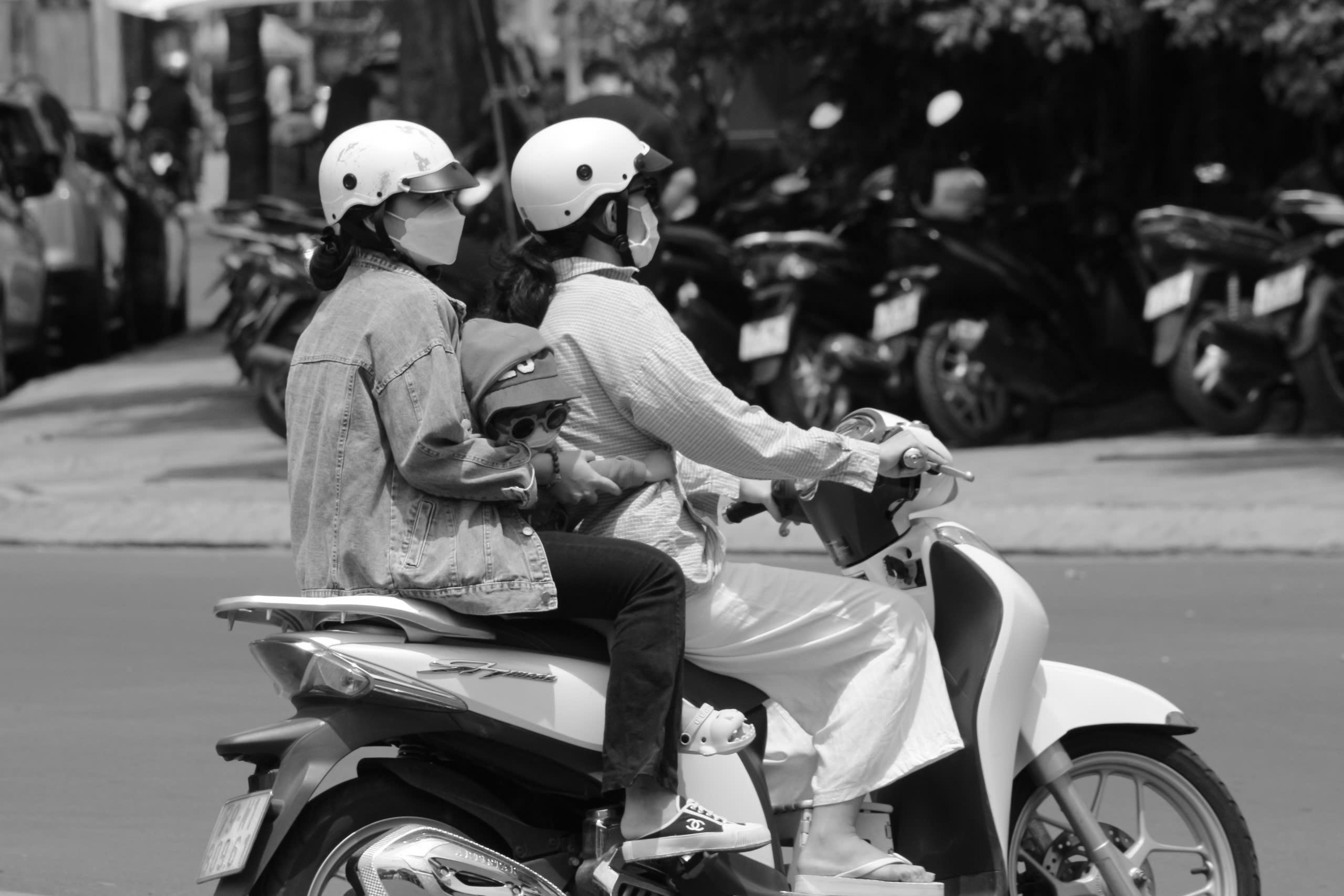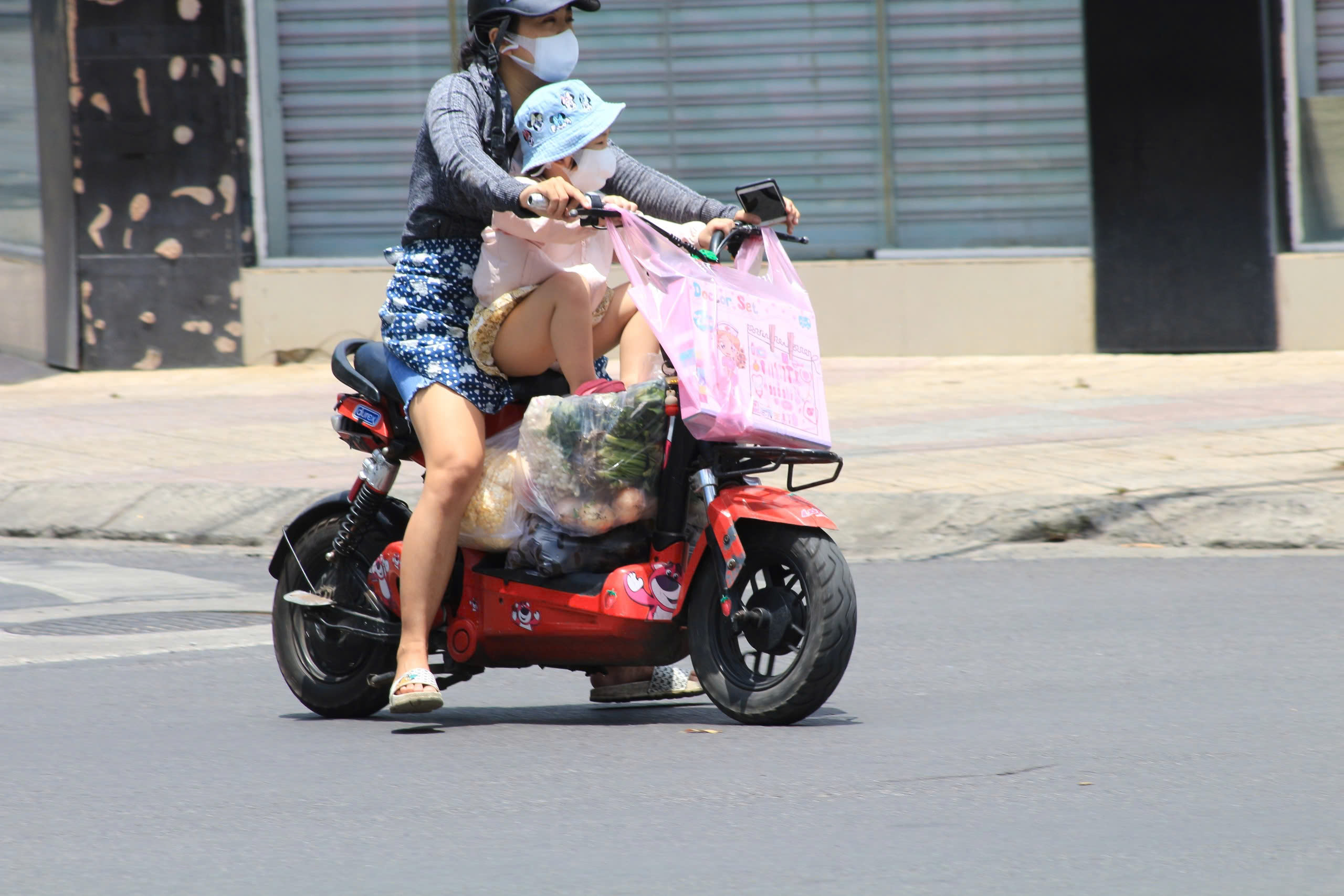Editor's note:This piece is written by Ray Kuschert, an Australian who has lived in Ho Chi Minh City for over 10 years. It is based on the author's observations and experiences.
In many countries, it is illegal for young children to ride as passengers on motorcycles. However, in Vietnam, the law permits children to ride on motorbikes from birth and does not mandate helmets for those under six years old.
I was out taking photos in Ho Chi Minh City recently when I captured an amazing close-up of a father and daughter riding a motorbike. The father had a helmet and the small three- or four-year-old girl was standing in front of him without any head protection.
I posted it on social media and was inundated with comments about how dangerous and stupid it was for the father to allow his child on a motorbike without a crash helmet. I countered that the father was not stupid, as the law specifically permits children under six to travel on a motorbike without wearing a helmet.
I can feel your blood pressure rising now, but before you lash out you need to consider the big picture. It is more than just an off-the-cuff decision to allow children on a motorbike without a helmet.
Anthony Bourdain said in his final Hanoi episode 10 years ago, “The one big thing about Vietnam is that when I came here in 2000 it was all bicycles and motorbikes. Now it is all cars and motorbikes.”
In fact, prior to 2007 there was no legal requirement to wear a crash helmet on a motorcycle in Vietnam, which is still the case in some U.S. states today. Changes to laws in Vietnam between 2007 and 2011 installed the need to wear helmets, and it took some time to catch on.
Even as late as 2012, when I first arrived in Vietnam, it was commonplace to see people riding around without helmets. Now, you occasionally see a person without a helmet but that is mostly restricted to areas like Thao Dien where some believe they are above the law.
As road safety regulations gradually evolved and enforcement strengthened, allowances for younger children were introduced, guided by practical considerations.
First, there’s the issue of weight. A properly manufactured motorcycle helmet, unlike ineffective fake helmets, would be too heavy for a small child. The constant movement of the motorbike would place significant strain on the child’s body, particularly their neck, making it difficult for them to wear such a helmet safely.
Next is the issue of size. While bicycle helmets may seem like a reasonable alternative, they are not designed for motorbike use and can obstruct the vision of smaller riders, such as mothers. This presents a challenge when it comes to legislating the use of bicycle helmets for motorbike passengers.
It is clear that most people in Vietnam cannot afford a car, so carrying a child on a motorbike is essential to survival for so many families across the country.
Children need to be on motorbikes and there is no product available to apply to the law to improve the safety of riding for children. This means that the government must make an exemption to helmet laws for children under six years of age.
This law also adds the specific requirements that helmets be purposefully constructed for use on a motorcycle and that straps are used correctly in the securing of the helmets to a person’s head.
A report by the World Health Organization in 2018 also suggested Vietnam’s laws on helmet use as 'Good' in their online data portal.
|
|
| A woman is seen carrying a child on her vehicle in this photo taken in Ho Chi Minh City. Photo: Ray Kuschert |
Speed is another factor that needs to be considered. The speed limit in cities is 40km per hour and that is rarely reached due to the traffic. Motorbikes in Vietnam go slow and they go even slower when carrying children.
The statistics of deaths caused by traffic accidents in Vietnam from 2013 to 2023 in Vietnam show that there was a consistent decline in deaths from 2013 to 2021, followed by a sharp increase in 2022, according to statista.com.
It is possibly related to post COVID-19 and record car purchases in Vietnam, followed by a decrease last year.
In 2022, Vietnam saw record car sales with 500,000 vehicles sold. This influx likely means more new and inexperienced drivers on the roads, increasing the risk of accidents.
I ride a motorbike every day in Vietnam and I sometimes see some crazy things that people do on the roads. However, not once in my 12-year association in Vietnam have I seen people acting stupid with a child on a motorbike.
Children not wearing helmets is not just about this utopian ideal of safety, it is about bringing logic, culture, and necessity together so people can live and enjoy life.
If the government banned children from riding all motorbikes, it would crush the culture. It would crush the opportunity for grandparents to see their grandchildren and for families to come together to celebrate special occasions.
Indeed, stopping children from riding on motorbikes breaks the very fabric of this culture that I love so much.
Personally, there is nothing I enjoy more than stopping at a traffic light and looking over at a child staring at me with a smile on their face. Speaking a few words in English or Vietnamese to a child and seeing their eyes light up is a life-changing experience every time. This moment beautifully captures the essence of Vietnam's culture.
As Westerners, we may believe that strapping a child into the back seat of a standard family car and driving at 80 km/h is safe. However, in reality, children involved in high-speed car accidents in basic vehicles face an equal or even higher risk of death or serious injury, regardless of location.
I agree with the road rules as are in Vietnam because, for the culture and the situation, they are logical and the best balance between safety and efficiency. They allow life to continue in communities and cities all over the country and they respect the poorer people of this nation.
When we look at the big picture of the road rules in Vietnam, we can see a very different picture to that of a child on a motorbike with no helmet. We need to be culturally aware and consider all the factors before we make conclusions. Vietnam is a place that cares and the laws are in place to make sure people can live and also care about their loved ones.
Like us on Facebook or follow us on Twitter to get the latest news about Vietnam!



















































